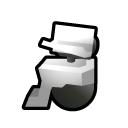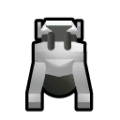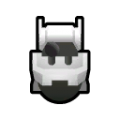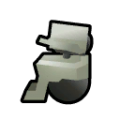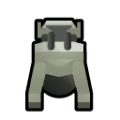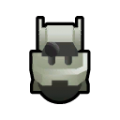Difference between revisions of "Lifter"
GingerWolf (talk | contribs) (Added body parts table) |
|||
| Line 63: | Line 63: | ||
== Health == | == Health == | ||
| − | + | ===Body Parts (Summary)=== | |
| − | {{Animal Health Table}} | + | {{Animal Health Table|Mech_Light}} |
== Gallery == | == Gallery == | ||
Revision as of 17:12, 25 February 2024
| This article relates to content added by Biotech (DLC). Please note that it will not be present without the DLC enabled. |
Lifter
A small mechanoid designed for hauling. Lacking a ranged weapon, it can make only weak melee attacks.
Base Stats
- Type
- Mechanoid
Armor
- Armor - Sharp
- 20%
- Armor - Blunt
- 10%
- Armor - Heat
- 200%
Pawn Stats
- Move Speed
- 2.8 c/s
- Body Size
- 0.7
- Mass
- 42 kg
- Pack Capacity
- 24.5 kg
- Carrying Capacity
- 53 kg
- Filth Rate
- 1
- Life Expectancy
- 2500 years
- Comfortable Temp Range
- -100 °C – 250 °C (-148 °F – 482 °F)
Melee Combat
- Attack
- Head
6 dmg (Blunt)
9 % AP
2.6 second cooldown - Average DPS
- 1.43
Creation
- Required Research
- Basic mechtech
- Gestation Cycles
- 1
A lifter is a mechanoid added by the Biotech DLC.
Acquisition
Lifters can be gestated by a mechanitor at a Mech gestator once the Basic mechtech research project has been completed. They require ![]() 50 Steel,
50 Steel, ![]() 1 Basic subcore and 1 gestation cycle taking 1,800 ticks (30 secs) each to initiate. They take up bandwidth from their linked mechanitor.
1 Basic subcore and 1 gestation cycle taking 1,800 ticks (30 secs) each to initiate. They take up bandwidth from their linked mechanitor.
Dead, friendly lifters can also be resurrected at the mech gestator using the "Resurrect light mechanoid" bill. This requires the corpse of the friendly Lifter, ![]() 25 steel, and 1 gestation cycle taking 1,800 ticks (30 secs) to initiate.
25 steel, and 1 gestation cycle taking 1,800 ticks (30 secs) to initiate.
Summary
As mechanoids, every lifter is immune to fire, Flame and Heat damage, and temperature extremes, despite having Comfortable Temperatures defined. They have 100% Toxic Resistance and Toxic Environment Resistance, making them immune to toxic buildup, rot stink and other toxic effects. They do not need to eat, rest, and have no mood. They will be stunned by EMP attacks for a time proportional to the EMP damage inflicted and will "adapt" and rendered immune to further EMP strikes for 2,200 ticks (36.67 secs).
Dead lifters may be shredded at the machining table or crafting spot for ![]() 10 steel. However, these values are affected by mechanoid shredding efficiency, as well as missing parts on the lifter.
10 steel. However, these values are affected by mechanoid shredding efficiency, as well as missing parts on the lifter.
Combat
Lifters can only make melee attacks. They have a melee hit chance of 62%, equivalent to a pawn with a Melee skill of 4.
As a labor-focused mech, lifters are never found in mechanoid raids.
As an ally
Mechs under player control require power: lifters use 10% of their power per day while active. If set to dormant self-charging, they instead recharge for 1% power / day, without pollution. They recharge in a mech recharger (200W), for 50% power/day, creating 5 wastepacks whenever the recharger's waste is filled up.
Work
| This section is a stub. You can help RimWorld Wiki by expanding it. Reason: Verify full list of possible tasks in light of 1.4.3534 changelog. |
Lifters will do all tasks under the Haul tab. Other than bringing items to other places, Lifters can also re-arm turrets, reinstall buildings, and more. Lifters move at 2.8 cells/s, which is roughly 61% as fast as a baseline human.
Analysis
Lifters have the benefits of being a mechanoid - they aren't human, and will constantly haul until they run out of power. While lifters move slower than colonists or animals, they spend the entirety of their time hauling. At minimum, mechs will work for 83% of the time (5 days of work, 1 day recharge, minus travel time), and they can be turned off when not required. Their lack of mood is useful for picking up far away items and cremating human corpses.
Finally, they are cheap to produce and amass. Their disposability is a unique benefit - you can have lifters pick up items near the map edge, and won't lose much if Randy decides to drop a pack of manhunters right on top of them.
Comparison to dryads
Compared to the Carrier dryad![]() , lifters move faster and are created faster. Carriers need to sleep, so lifters can work for longer before needing to charge. Carriers require active pruning, while lifters are autonomous from their master. You can turn off a lifter when hauling isn't required, but you need to keep pruning the gauranlen tree every day. However, lifters require Electricity and a mechanitor to function, and create pollution. Meanwhile, carriers are available from the neolithic era.
, lifters move faster and are created faster. Carriers need to sleep, so lifters can work for longer before needing to charge. Carriers require active pruning, while lifters are autonomous from their master. You can turn off a lifter when hauling isn't required, but you need to keep pruning the gauranlen tree every day. However, lifters require Electricity and a mechanitor to function, and create pollution. Meanwhile, carriers are available from the neolithic era.
Health
Body Parts (Summary)
| Body Part Name | Health | Quantity | Coverage[1] | Target Chance[2] | Subpart of | Internal | Capacity[3] | Effect if Destroyed/Removed |
|---|---|---|---|---|---|---|---|---|
| Thorax | 40 | 1 | 100% | 40% | N/A[4] | - | Death Will never take permanent injury | |
| Neck | 30 | 1 | 10% | 2% | Thorax | Communication | Death Will never take permanent injury | |
| Head | 30 | 1 | 80% | 4.6% | Neck | - | Death Will never take permanent injury | |
| Artificial Brain | 10 | 1 | 10% | 0.8% | Head | Data Processing | Death Will never take permanent injury | |
| Sight Sensor | 10 | 1 | 13% | 1% | Head | Sight | −25% Sight. −100% if both lost. Will never take permanent injury | |
| Hearing Sensor | 10 | 1 | 10% | 0.8% | Head | Hearing | −25% Hearing. −100% if both lost. Will never take permanent injury | |
| Chemical Analyzer | 10 | 1 | 10% | 0.8% | Head | - | Will never take permanent injury | |
| Leg | 30 | 2 | 20% | 16% | Thorax | Moving | −50% Moving. Will never take permanent injury | |
| Foot | 20 | 2 | 20% | 4% | Leg | Moving | −50% Moving. Will never take permanent injury | |
| Reactor | 20 | 1 | 6% | 6% | Thorax | Power Generation | Death Will never take permanent injury | |
| Fluid Reprocessor | 15 | 1 | 4% | 4% | Thorax | Fluid Reprocessing | Death Will never take permanent injury |
- ↑ Coverage determines the chance to hit this body part. It refers to the percentage of the super-part that this part covers, before its own sub-parts claim their own percentage. For example, if the base coverage of the super-part is 100%, and the coverage of the part is 20%, 20% of hits would hit the part, and 80% the super-part. If the part had its own sub-part with 50% coverage, the chances would be 10% sub-part, 10% part, 80% super part.
- ↑ Target Chance is the actual chance for each part to be be selected as the target when each part's coverage has been taken into account(I.E. Neck covers 7.5% of Torso but Head covers 80% of Neck so it actually has only a 1.5% chance to be selected). This is not pure hit chance, as different damage types propagate damage in different ways. See that page for details.
- ↑ Note that capacities can affect other capacities in turn. Only the primary effect is listed. See specific pages for details.
- ↑ This is the part that everything else connects to to be considered 'connected'.
Gallery
Version history
- Biotech DLC Release - Added.
- 1.4.3528 - Fix: Lifters can try to haul themselves to a transport pod.
- 1.4.3534 - Added more allowed work types to lifter mechs. Can now do cremation.
